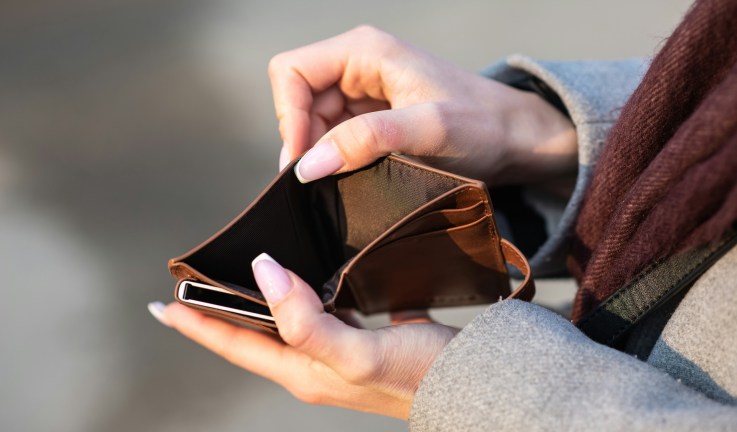“As buy now, pay later has grown in popularity, its use has bled into pretty much every online checkout, and that’s meant not just larger purchases, but everyday expenses, groceries, things people rely on, have become available on buy now, pay later.”
Writing for the Big Issue, Vikki Brownridge, StepChange CEO, claimed “around half of the population have now used BNPL at some point”.
She claims, however, that just because the option is popular, “doesn’t automatically mean it’s safe”, and “just because it’s interest-free doesn’t mean it’s risk-free”.
What are the benefits and drawbacks of BNPL?
While experts say buy now, pay later – when used carefully – can be a useful way to spread the cost of certain items, they also insist that these plans are not without risk, and customers should be aware of issues like late fees, warning that debts can “build up quite quickly”.
The Financial Conduct Authority (FCA) found that BNPL users were more than four times as likely to have missed a payment of a bill or credit commitment in three of the six months to January 2023 (27% vs 6%).
Grace Brownfield, head of influencing and communications at National Debtline, explained: “We understand that it can seem like an attractive payment method because it allows you to delay payment and separate it out into instalments, which could appear useful for spreading costs or managing fluctuating incomes throughout the month. However, the amount owed can build up quite quickly, particularly when using buy now, pay later to cover essential spending that someone may not have the funds for in reality.
Advertising helps fund Big Issue’s mission to end poverty
“This can cause problems when repayment is due, as a significant amount of debt may have been accrued.”
Trevethick added that while StepChange is “not inherently against the use of buy now, pay later” and that it can be a “really useful way to bridge your finances between a purchase you might not be able to afford over a month, but would over three months”, customers should be aware of the risks, explaining: “People don’t view buy now, pay later as credit and as borrowing, when that’s exactly what it is.”
“The issue with buy now, pay later is that it doesn’t come under the same regulation as other forms of credit at the moment, so there aren’t proper affordability checks, there’s no credit data sharing,” he said.
“This will have profound impacts for people who are borrowing, who may perhaps have difficulties paying that money back later.”
He explained that “millions of people” use BNPL every year “without issue”, however if people are regularly using such schemes “to cover the cost of essential goods” like food or toiletries, or if people have multiple BNPL debts, it could be a “red flag” for being in a situation “where you’re unable to meet your essential expenditure”.
“You could benefit from a conversation with either your lender [who you owe money to] or an organization like StepChange,” he explained.
Advertising helps fund Big Issue’s mission to end poverty
What are the new rules?
The government has said new regulations to the BNPL industry to protect customers using payment services like Klarna will come into effect in 2026.
Currently, the BNPL industry is not regulated, and the Treasury stated new proposals would see BNPL companies placed under the supervision of the FCA, and that the Consumer Credit Act would be applied to them.
The new rules mean BNPL companies will have to undertake affordability checks before people can sign up to use payment plans. Companies will also need to “provide clear, simple and accessible information about loan agreements in advance” so shoppers can be more aware of the risks associated with late repayments. BNPL users will also be given “stronger rights” if issues arise with products they purchase, giving them access to the Financial Ombudsman Service to make complaints.
Martin Lewis, founder of MoneySavingExpert.com, welcomed the changes, however added that customers should be “very wary” of BNPL until regulations come into effect in 2026.
“Buy now, pay later is now ubiquitous at online checkouts, so the fact it’s never been regulated is a travesty,” he said.
“BNPL can be useful, allowing those who need to spread payments for a budgeted, necessary purchase like a plumber to do it interest-free. Yet it’s been sold as a lifestyle choice, not a debt, and pushed for instinct buys or even takeaways. Too many are in trouble with multiple BNPL repayments, leading to debt-chasing and credit file damage.
Advertising helps fund Big Issue’s mission to end poverty
“Regulation will mean firms must be overt that it’s a debt, have proper affordability rules, and will crucially let people go to the ombudsman if things go wrong.”
Are there alternatives to buy now, pay later?
Buy now, pay later is a type of payment plan that several companies have adopted, so any service that allows a person to spread payments over several months would come under the label ‘BNPL’.
If you’re struggling to afford certain items, experts point out that there are other ways to borrow – though they warn against turning to payday loans, which can carry extremely high interest rates.
If you’re using BNPL to afford the essentials, it may be worth checking if you’re eligible for any grants, loans, or support with bills like council tax. If you’re struggling to afford food, you may be able to get help from a local food bank.
StepChange and Turn2us highlighted benefits checkers that could ensure you’re receiving everything you’re entitled to. If you’re already on universal credit, you can apply for a budgeting advance to pay for essentials if you meet certain criteria. This is an interest-free advance on your universal credit.
Credit unions could also be an alternative; credit unions are co-operatives whose members pool their savings to provide each other with credit, usually with low interest rates. Citizens Advice states credit union loans “usually work out cheaper than home credit or payday loans”, and while they’re not interest-free – nor risk-free – they could be an alternative method of borrowing.
Advertising helps fund Big Issue’s mission to end poverty
Brownfield said: “There are many forms of credit available to people, including other sources of interest-free credit, but every type carries risk.
“In the case of interest-free credit sources, late fees will often apply should payments be delayed or missed, further adding to someone’s debt. It is important for anyone considering taking out any type of credit to make sure that it is affordable and the right product for them to avoid getting into difficulty further down the line.”
What should I do if I’m struggling with BNPL debts?
If you’re struggling with any kind of debt, including BNPL debts, it’s important to reach out to a charity or organisation for help. Charities including StepChange, National Debtline, PayPlan, Citizens Advice and Debt Advice Foundation are just a few of the places you can reach out to, and they may be able to advise you on how to manage debts in a sustainable way.
The Big Issue has compiled some further debt advice, including who to turn to if you’re struggling with debt.
“There are straightforward ways that someone could take action should they find themselves struggling to pay off buy now, pay later items,” Brownfield said. “Firstly, it is important to speak to the lender and explain the difficulties. They may be able to help you or amend your repayment schedule.
“Seeking free debt advice from a service like National Debtline can help you understand what you owe and help you put together a budget which is a good starting point for any repayment plan.”
Advertising helps fund Big Issue’s mission to end poverty
Do you have a story to tell or opinions to share about this? Get in touch and tell us more. Big Issue exists to give homeless and marginalised people the opportunity to earn an income. To support our work buy a copy of the magazine or get the app from the App Store or Google Play.






